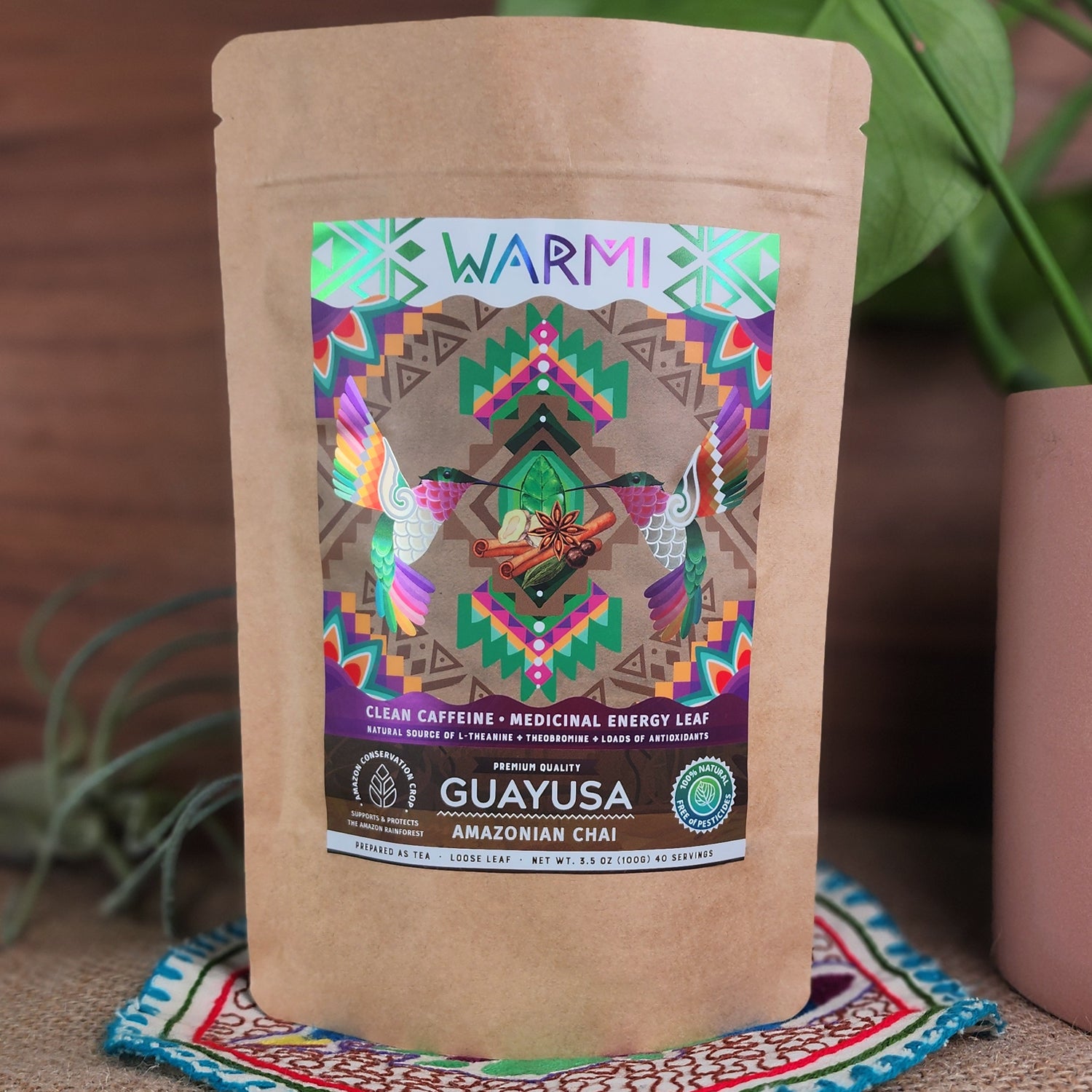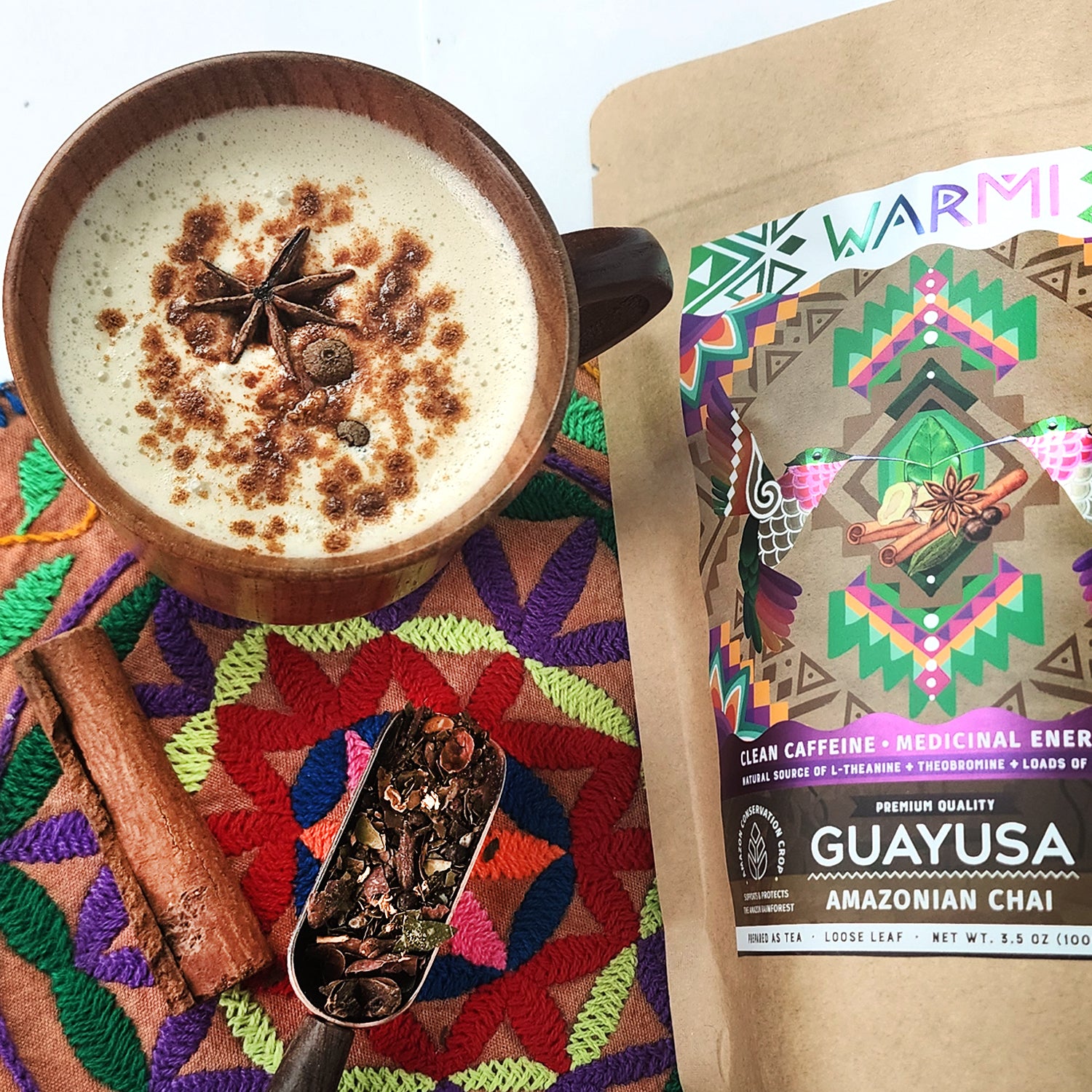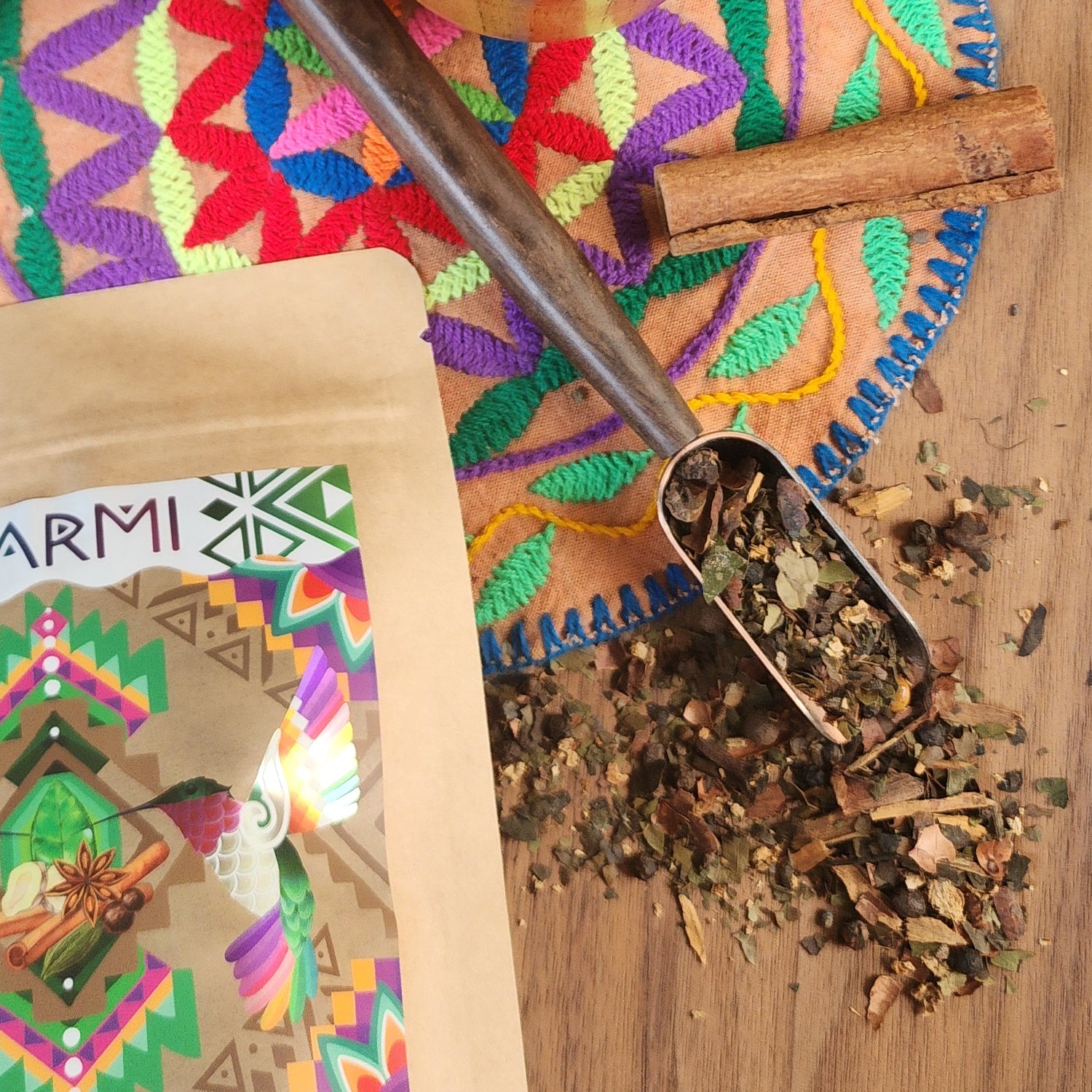Guayusa Chai 3.5 oz.
Our aromatic Guayusa Chai blends India with the Amazon, creating absolute taste-bud heaven with milk or cream. It features our premium sun-dried Guayusa, cacao, cardamom, anise seed, and ginger, all locally sourced in Ecuador. Guayusa is traditionally wildcrafted, and all other ingredients are 100% free of additives or pesticides.
INGREDIENTS & CONTENT:
Premium Loose-leaf Guayusa, Arriba Cacao Shells, Cardamom, Cinnamon, Ginger, Anise Seed, Pepper • 50 Servings
Couldn't load pickup availability
Preparation
Guayusa is great served hot or cold or with lemon or honey. In addition, the leaves may be boiled or steeped many times without losing their flavor.
Use 1-2 tablespoons or more of finely ground Guayusa leaves per 8 oz. of water which can be prepared using the follow methods:
TEA POT: Boil water, add crushed leaves and steep for 5-10 minutes. The longer it steeps, the stronger and darker the brew.
DRIP COFFEE MAKER: Prepare as you would normally brew your favorite coffee.
FRENCH PRESS: Prepare as you would normally brew your favorite coffee or tea.
GUAYUSA’S BENEFITS


CLEAN, SUSTAINED ENERGY + FOCUS
Guayusa not only energizes but also supports cognitive function. It’s renowned for its jitter-free, joyful energy and enhanced focus effects, thanks to its natural unique blend of Caffeine, L-theanine, and Theobromine!
This 3-in-1 synergy is only found in Guayusa, resulting in heightened focus, alertness, an elevated mood, and mental clarity.
Guayusa evokes a blend of warrior-like vitality and a soothing, feminine embrace. This energetic combination promotes alertness, focus, a joyful mood, and an overall feeling of well-being.
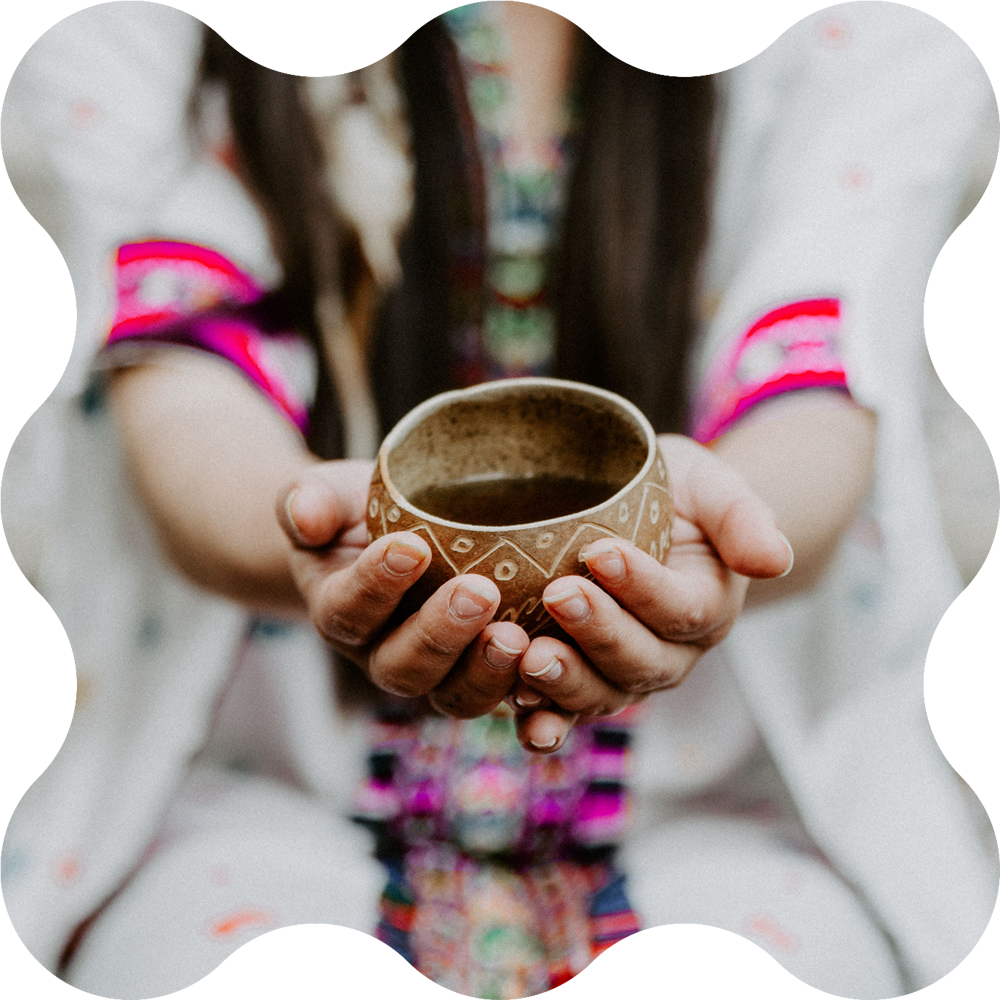
RICH IN ANTIOXIDANTS
Guayusa naturally contains several key antioxidants, including polyphenols, flavonoids, and carotenoids. Studies have demonstrated that Guayusa exhibits high antioxidant capacity according to the ORAC value chart, indicating its effectiveness in neutralizing free radicals.
Antioxidants also play a crucial role in supporting health by:
• Reducing inflammation in the body
• Protecting the cardiovascular system
• Enhancing immune function
• Anti-aging
• Potentially preventing cancer

STOMACH, LUNG, & KIDNEY SUPPORT
Guayusa’s antioxidants, including phenolic compounds like chlorogenic acid and quercetin-3-O-hexose, help reduce inflammation and alleviate digestive issues such as bloating.
Additionally, guayusa’s caffeine content acts as a bronchodilator, improving lung function and potentially reducing asthma symptoms.
The diuretic properties of guayusa promote urine production, aiding in the elimination of toxins and supporting kidney function while its antioxidants help mitigate oxidative stress related to kidney damage.

HEIGHTENS DREAM RECALL
Guayusa has been traditionally used by indigenous communities to enhance dream experiences, including lucid dreaming and improved recall. Historically, it is said to create a deeper connection to the dream world. Shamans often use guayusa for divination and guidance, highlighting its spiritual and cultural significance.
The dream-enhancing properties of guayusa are linked to its unique chemical composition, which includes caffeine, L-theanine, and theobromine.
Caffeine may boost alertness and dream vividness, while L-theanine promotes relaxation without inducing drowsiness, aiding in lucid dreaming.
Theobromine is also associated with more vivid dreams, making guayusa a popular choice for those seeking to enrich their nocturnal experiences.
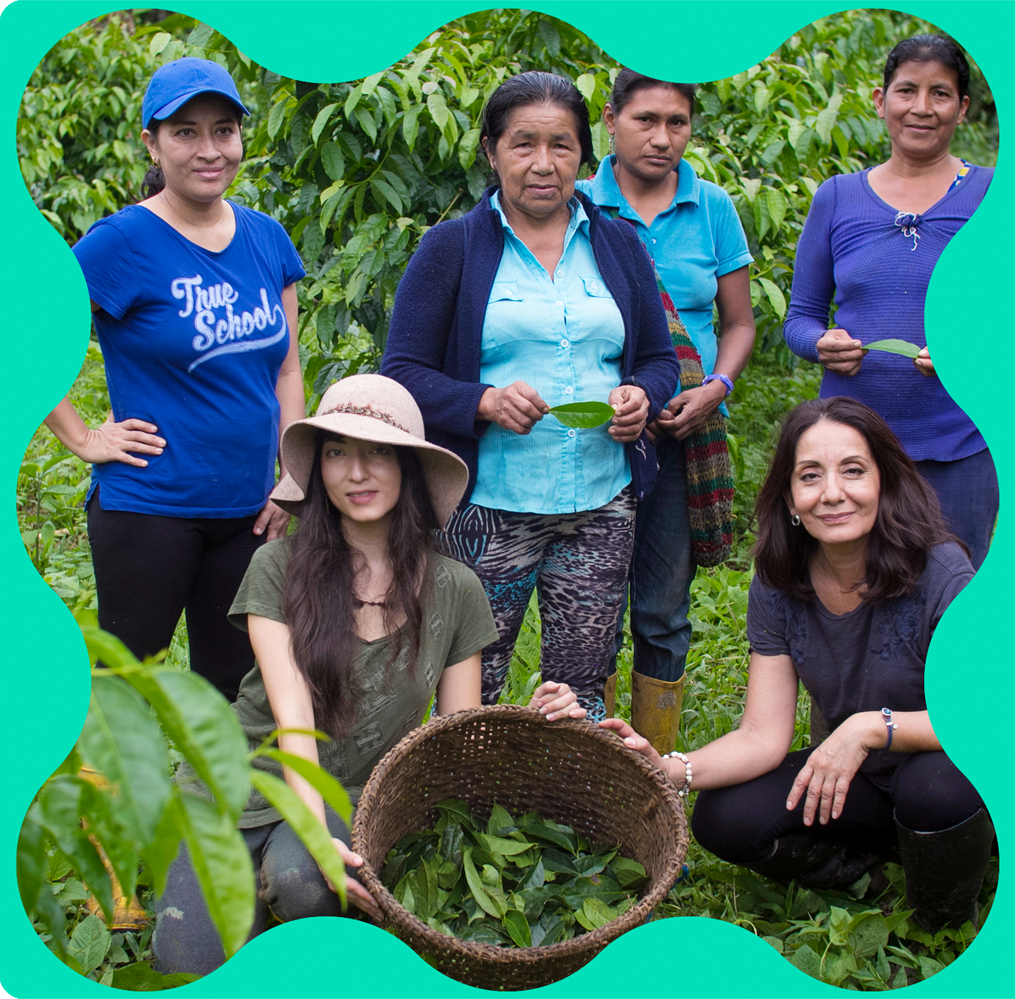
Premium Quality Rooted in Tradition
WARMI takes pride in offering a superior Guayusa experience that honors indigenous traditional practices. Our commitment to quality sets us apart from mass-produced alternatives, ensuring you receive the finest Guayusa nature has to offer.
Unlike conventional Guayusa producers who rely on industrial dehydration methods, WARMI upholds ancestral techniques by collaborating directly with indigenous communities who hand-dry the leaves, preserving the plant’s spirit and essence.
Our artisanal approach yields a Guayusa of high quality flavor and nutrition. By forgoing artificial dehydrators and ovens, we embrace a natural, extended oxidation process. This patient method preserves the leaves’ amino acids, unlocking potent flavors that mass-produced guayusa simply cannot match.

Sustainability & Amazon Conservation

WARMI sources Guayusa from biodiverse agroforestry systems called chacras, which mimic the natural structure of Amazonian rainforests. These traditional plots integrate a wide variety of native plants, supporting ecological balance and helping local communities protect their land from oil extraction and deforestation.
Unlike coffee and yerba mate—often grown in monocultures that require forest clearing—Guayusa thrives naturally in the Amazon without pesticides, synthetic fertilizers, or land clearing. Its intercropping methods enhance soil quality, boost biodiversity, and promote carbon sequestration.
Choosing Guayusa means enjoying an energizing, flavorful brew while supporting sustainable agriculture, Indigenous livelihoods, and the conservation of Ecuador’s Amazon rainforest.

